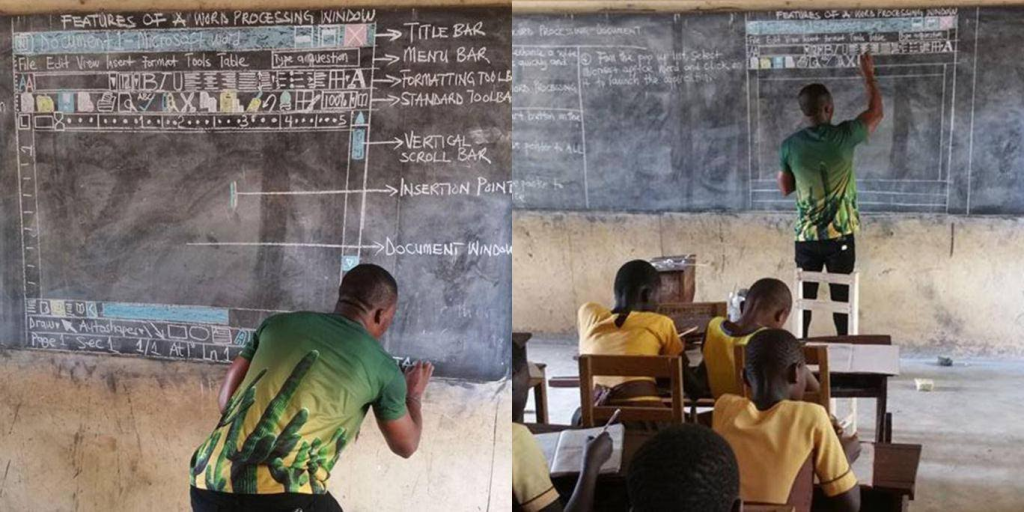This Teacher in Ghana Taught Students Microsoft Word Without a Computer
In a small classroom in rural Ghana, a teacher picked up a piece of chalk and turned to a blackboard. But this was no ordinary lesson. Richard Appiah Akoto carefully sketched out a detailed replica of a Microsoft Word processing window, bringing technology to life through artistry and determination.

Akoto is the information and communication technology (ICT) teacher at Betenase M/A Junior High School in Sekyedomase. His students, ranging from ages 14-15, are expected to take a national exam in ICT. But with no computers, he has had to improvise.
“My students have no idea what Microsoft Word is or how it works,” said Akoto. “So I draw it for them on the blackboard as best I can.”
The remarkable chalkboard drawings quickly went viral after Akoto posted pictures on Facebook. His motivation was simple – to give his students a chance to succeed.

“These kids want to learn so badly,” Akoto said. “But we have nothing. No textbooks, no computers. So I use my chalk to show them.”
Students at the rural school face high hurdles. Most come from low-income families relying on agriculture. The school struggles to afford basic supplies, let alone computers. But where others saw obstacles, Akoto saw opportunity.
Akoto’s meticulous chalk illustrations capture everything from Word’s formatting options to Excel spreadsheets. By his own admission, it’s not perfect. But it allows students to envision the technology critical for their future.




“It is difficult without physical computers,” shared 15-year old Adjoa Kantinka. “But Mr. Akoto makes it come alive on the board. I can imagine myself using the software.”
When pictures of Akoto’s classroom went viral online, people were inspired. Many posted words of encouragement. Others wanted to know how they could help.
Soon donations began arriving at the modest rural school. An anonymous benefactor sent the first computer. Then came more – laptops, desktops, a fully outfitted computer lab. What once seemed impossible was now a reality.
Akoto beams with pride as he sees his students explore basic computer skills firsthand. No longer confined to chalkboard simulations, they now access real word processing, spreadsheet, and presentation software.
“This changes everything,” Akoto said. “Now my students can build the skills they need to succeed. Knowledge is power.”
Headmaster Moses Gyamfi calls Akoto a visionary. “He saw the challenges not as problems, but as possibilities,” Gyamfi said. “His creativity sparked a chain reaction that transformed our school overnight.”
But Akoto remains humble. “This is not about me,” he said. “It’s about making sure these kids have the tools to shape their futures.”
Students now stay late after school just to gain extra time on the computers. Adjoa Kantinka shared how ignoring the obstacles facing her rural community used to feel normal. “Now I realize with technology, the world is at my fingertips,” she said.
Akoto hopes his story inspires others to take action too.
“Support your local schools, donate supplies, volunteer skills,” Akoto said. “We can all do something to help students reach their potential.”
Though the chalkboard art catapulted Akoto to fame, he prefers quiet humility. He continues to arrive early each day, teaching with the same passion and care. But now his students have the computers and technical skills they need to thrive.
“This is just the beginning,” Akoto said with a smile.